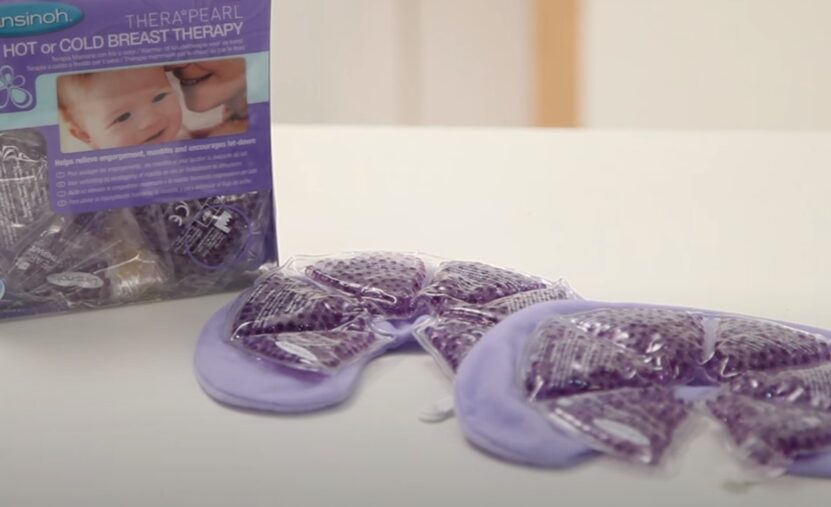Dealing with sore breasts is a common experience during pregnancy, affecting many expectant mothers. This discomfort, often due to hormonal changes and increased breast size, can be challenging to manage.
However, there are practical steps you can take to alleviate this soreness and make your pregnancy journey more comfortable. The following seven tips offer effective ways to care for sore breasts during this special time.
1. Wear the Right Bra

Investing in a good maternity bra is crucial as your regular bras won’t suffice anymore. Look for maternity bras offering firm support and made of breathable fabrics, such as cotton or moisture-wicking materials, to prevent discomfort and skin irritation.
These bras also come with wider straps and a more adjustable closure to accommodate your changing body.
Consider a sleep bra for added comfort during the night. These bras are softer, less structured, and provide gentle support, reducing the likelihood of discomfort while you sleep.
Getting fitted regularly is important, as your breast size can change throughout your pregnancy. Professional fittings every few months can ensure you’re wearing the right size, thus avoiding unnecessary pressure or chafing.
2. Apply Warm or Cold Compresses

Warm compresses can soothe pain effectively. Use a warm towel or a heating pad on a low setting, but be sure to limit the application to short periods to avoid overheating, which can be harmful during pregnancy.
You can also use a warm shower as an alternative to help ease the tenderness.
Cold compresses work well to reduce swelling and provide a numbing effect for pain relief. You can wrap ice packs or frozen vegetables in a soft cloth to avoid direct skin contact and apply them gently for short periods.
Alternate between warm and cold treatments to find out which provides better relief for your symptoms.
3. Gentle Massage
When massaging, it’s essential to use safe oils or lotions specifically designed for pregnant women. These products are often free from harmful chemicals and fragrances that could irritate sensitive skin.
A gentle massage can significantly improve circulation and ease discomfort, providing a soothing and relaxing experience. Remember to avoid aggressive techniques.
Gentle, circular motions are best for massaging sore breasts. Avoid pressing too hard, as excessive pressure can exacerbate soreness.
Focus on being gentle and responsive to how your body feels, and stop immediately if you experience any pain or discomfort.
4. Stay Hydrated and Maintain a Balanced Diet

Drinking plenty of water is crucial for pregnant women. Not only does it help in maintaining healthy breast tissue, but it also aids in reducing the chances of urinary tract infections, which are common during pregnancy.
Moreover, water helps in the transportation of nutrients and oxygen to your baby.
Maintaining a balanced diet is equally important. Ensure your diet includes foods rich in Omega-3 fatty acids, like fish and nuts, which are beneficial for your baby’s brain development.
Foods like berries, leafy greens, and nuts are packed with antioxidants and can help reduce inflammation, making them an excellent choice for managing breast soreness.
5. Avoid Irritants

When selecting fabrics, soft, natural fibers like cotton are ideal as they allow the skin to breathe, reducing the risk of irritation and discomfort. It’s also wise to avoid underwires in bras, as they can put additional pressure on already sensitive breasts.
When it comes to skincare products, opt for hypoallergenic options that are free from harsh chemicals and fragrances. These products are gentler on the skin and less likely to cause irritation.
Consider using a mild, unscented detergent for washing your clothes and linens to minimize skin irritation.
6. Exercise Regularly
Gentle exercises, such as walking or prenatal yoga, are excellent for improving blood circulation, which can alleviate breast soreness.
Swimming is another low-impact exercise that can be particularly soothing, as the water supports your weight and helps ease joint and breast discomfort.
However, it’s crucial to wear a supportive sports bra during these activities to provide additional support to your breasts.
Always consult with your doctor before starting any new exercise regimen during pregnancy, as they can provide personalized advice based on your health and pregnancy status.
7. Consult with a Healthcare Professional

Regular check-ups with your healthcare provider are essential. These visits are an opportunity to discuss any changes or concerns, including breast soreness.
Your doctor can also monitor your overall pregnancy progress and provide advice tailored to your specific needs.
If you experience severe discomfort or any changes in your breasts, such as lumps or discharge, seek medical advice promptly. It’s always better to be cautious and ensure that both you and your baby are healthy.
Remember, your healthcare professional is your partner in ensuring a safe and healthy pregnancy.
FAQs
Can I use a regular heating pad for warm compresses during pregnancy?
Yes, you can use a regular heating pad for warm compresses. However, make sure to use it on a low setting and limit the application time to prevent overheating.
Are there any specific exercises to avoid for breast soreness during pregnancy?
High-impact exercises or activities that involve excessive bouncing or jarring movements should be avoided, as they can exacerbate breast soreness. Stick to low-impact exercises like walking, swimming, or prenatal yoga.
How often should I change my maternity bra size during pregnancy?
It’s recommended to get fitted for a maternity bra every few months or whenever you notice changes in your breast size. This ensures consistent comfort and support as your body changes.
Can dietary changes affect breast soreness during pregnancy?
Yes, a balanced diet rich in Omega-3 fatty acids, antioxidants, and hydration can help manage breast soreness. Foods that cause water retention or are high in sodium may increase discomfort.
Are there any relaxation techniques that can help with breast soreness during pregnancy?
Relaxation techniques like deep breathing, meditation, and gentle stretching can help alleviate stress, which may in turn reduce breast soreness. These methods also promote overall well-being during pregnancy.
Is it safe to use over-the-counter pain relief for sore breasts during pregnancy?
Before using any over-the-counter pain relief, it’s important to consult with your healthcare professional. They can recommend safe options specific to your pregnancy and health needs.
Summary
Dealing with sore breasts during pregnancy can be challenging, but it’s a common experience for many. By following these seven tips, you can significantly reduce discomfort and make your pregnancy journey more comfortable.
Every woman’s experience is unique, so it’s important to listen to your body and consult with healthcare professionals for personalized advice.

